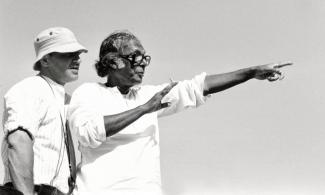
LEGENDARY filmmaker Mrinal Sen, one of the architects of India’s “parallel cinema” movement, passed away at the age of 95 on December 30, 2018.
A Marxist, Mrinal Sen was closely associated with the Indian People’s Theatre Association (IPTA) between 1943-47, though never a member of the Communist Party. He made films that sensitively explored Indian society - in diverse Indian languages. He made films in Bengali, Hindi, Odiya, and Telugu.
His film Neel Akasher Neechey (1959)- set in the 1930s and exploring both anti-colonial nationalism and the class divide in Indian society - was the first film ever to be banned in independent India. The film irked India’s first Government because it showed the apathy of India’s elites towards its poor and disadvantaged people, even though both lived even ‘under the same blue sky.’ The ban was lifted after three months - but was an early sign of the Indian State’s high-handedness and hostility to dissent.
He won special jury prizes for Akaler Shandhaney (In Search of Famine, 1981) at Berlin and Kharij (The Case Is Closed, 1982) at Cannes.
He made his mark in Hindi cinema with Bhuvan Shome (1969), about a curmudgeonly bureaucrat transformed by his friendship with a village girl. He brilliantly explored the themes of 1970s India in many films. Interview (1971) follows a young man who can’t get a job because he lacks a suit to wear. Calcutta 71 (1972) shows many aspects of deprivation and poverty on the one hand, and privileged hypocrisy on the other, ending with a young Naxalite being killed in cold blood by the police. Padatik (1973) also explored the contradictions between middle class consciousness and a young Naxalite revolutionary. Mrigayaa (1976) is a powerful film set in the backdrop of the Santhal rebellion and colonial rule which starkly unpacked the double standards of the colonial state, which rewarded ‘hunting down’ revolutionaries and wild animals - but punished the killing of oppressors. What was true of the colonial state is as true of the Indian State today - and that is what makes the film powerful, disturbing, and contemporary even in today’s India.
Ek Din Pratidin (1979) was a brilliant commentary on middle class patriarchy in India which circumscribes women’s autonomy even as it needs women to earn. This was reflected in a family’s response when their young daughter who is also the main breadwinner fails to return home one night - and then returns the next morning.
Mrinal Sen’s mark on Indian cinema will last long after he is gone.
Liberation Archive
- 2001-2010
-
2011-2020
- 2011
- 2012
- 2013
- 2014
- 2015
- 2016
- 2017
- 2018
-
2019
- JANUARY-2019
-
FEBRUARY-2019
- Republic Day 2019: Rescue India from the Modi Disaster Rebuild Indian Democracy
- 10% EBC Reservation: Expose and Rebuff the Modi Government's Desperate Deflection Tactics
- New Year Begins With New Hope
- Citizenship and Sedition: BJP's Communal And Repressive Agenda
- All India Workers' Strike 2019
- Repression Unleashed On Daikin Workers
- Indefinite Strike by Mid-Day Meal Cooks in Bihar
- The Bhojpur Revolutionaries Fought For Freedom, Equality, Justice And Unity
- 15th Martyrdom Day of Mahendra Singh : Rally Pledges to Defeat BJP, Hoist Red Flag Over Bagodar
- Socialism 2018: People's Need Not Corporate Greed
- A Conversation With A Young MP From Spain's Podemos
- Somyot's Story Affirms The Importance of International Solidarity
- With Trumpets Blazing : Martyrdom Centenary of Rosa Luxemburg and Karl Liebknecht
- SD: Saroj Dutta and his Times
- Mrinal Sen (1923-2018)
- "Universal Basic Income" : The Next 'Jumla'?
- MARCH-2019
- APRIL-2019
- May-2019
- LIBERATION, JUNE 2019
- Liberation JULY 2019
- LIBERATION, August 2019
- Liberation, SEPTEMBER 2019
- Liberation, OCTOBER 2019
- Liberation, NOVEMBER 2019
- Liberation, DECEMBER 2019
- 2020
- 2021-2030
Charu Bhawan, U-90, Shakarpur, Delhi 110092
Phone: +91-11-42785864 | Fax:+91-11-42785864 | +91 9717274961
E-mail: info@cpiml.org







